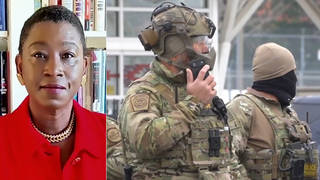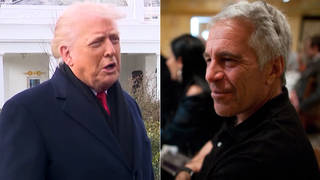
Illinois Governor JB Pritzker is calling for federal agents to pause immigration enforcement in the Chicago area until after Halloween, amid widespread condemnation of violent arrests and confrontations with residents. Meanwhile, the person at the center of much of Chicago’s enforcement, Border Patrol chief Gregory Bovino, did a five-hour deposition Thursday in a case challenging federal agents’ treatment of protesters, journalists, children and immigrants. Bovino is “in charge of the Chicago raids. And that style of aggressive, militarized enforcement is something that the Trump administration loves, because it plays very well for them among their base,” says Aaron Reichlin-Melnick, senior fellow at the American Immigration Council. He also discusses the rapid expansion of immigration detention, the normalization of racial profiling by federal agents, arrests of U.S. citizens and more.
Transcript
AMY GOODMAN: Illinois Governor JB Pritzker is calling for federal agents to pause their immigration enforcement in Chicago until after Halloween, amidst widespread condemnation of chaotic and violent arrests, confrontations with residents.
GOV. JB PRITZKER: I’ve sent a letter to Kristi Noem and to the Department of Homeland Security leadership, asking them to pause all of their federal agent operations for the entirety of the Halloween weekend. I’m asking for basic human decency. I think their response will be revealing. They’ve disrupted everything for more than two months already. Give the children and the families of Illinois a break.
AMY GOODMAN: Governor Pritzker also wrote in the letter to Noem, quote, “No child should be forced to inhale tear gas or other chemical agents while trick or treating in their own neighborhood,” unquote. But on Thursday, DHS Secretary Noem rejected Pritzker’s request. She was speaking from Gary, Indiana.
HOMELAND SECURITY SECRETARY KRISTI NOEM: We’re absolutely not willing to put on pause any work that we will do to keep communities safe. The fact that Governor Pritzker is asking for that is shameful and, I think, unfortunate that he doesn’t recognize how important the work is that we do to make sure we’re bringing criminals to justice and getting them off our streets.
AMY GOODMAN: This comes as a federal judge Thursday ordered the person at the center of much of Chicago’s enforcement, Border Patrol Commander Gregory Bovino, to appear for a deposition to explain federal agents’ use of tear gas and other less lethal weapons against protesters who have taken to the streets to oppose the Trump administration’s immigration crackdown.
Meanwhile, Homeland Security Secretary Kristi Noem is replacing ICE leadership at half the country’s field offices with Border Patrol officials in regions where President Trump is demanding more immigration raids and arrests. In recent weeks, CNN has reported the Trump administration plans to build a new network of mass immigration jails that can hold up to 100,000 prisoners by funneling billions of dollars through the Navy to help facilitate the construction.
To talk about this and more, we’re joined in Washington, D.C., by Aaron Reichlin-Melnick, senior fellow at the American Immigration Council.
Welcome back to Democracy Now!, Aaron. Let’s start with the plea from the Illinois Governor JB Pritzker not to tear-gas children while they’re trick or treating, and the Homeland Security — the Homeland Security secretary’s response.
AARON REICHLIN-MELNICK: Yeah, what I think you see here is that Secretary Noem wants these mass deportation operations to keep going, no matter the consequences, no matter the day, no matter the disruption that it has on American communities. And they are more and more aggressive as they expand the workforce and really try to make Chicago an example for the country, so that people understand what is coming to other cities throughout the Trump administration.
AMY GOODMAN: Talk about what’s happening, for example, right now in Chicago, and particularly talk about what it means that Border Patrol is replacing ICE at about half the field offices across the United States, and what exactly that means, and how Bovino, the head of CBP, has been called before a judge and another hearing next week.
AARON REICHLIN-MELNICK: Yeah, well, I think what it means is that the administration wants enforcement on the streets, immigration enforcement, to look more like what is happening in Chicago. Commander Bovino, or Chief Bovino, has been the one in charge of the Los Angeles raids. Then he was moved to Chicago; he’s in charge of the Chicago raids.
And that style of aggressive, militarized enforcement is something that the Trump administration loves, because it plays very well for them among their base. You even see that they often bring videographers to these arrest operations, themselves masked and in camouflage uniforms, so that they can capture it and post these videos on social media. And the Trump administration believes that that kind of enforcement is the model that they want to pursue, because it lets them give this perception to their base that they are being more aggressive than ever before, than any previous administration, even than ICE itself was doing.
AMY GOODMAN: If you can talk about specifically how unusual it is, while a judge has stopped this for the moment, that the judge in Bovino’s case said she wanted him to report to her every day? That’s not at the moment happening, but the issue of bodycam and what is causing Judge Ellis’s response?
AARON REICHLIN-MELNICK: Yeah, so, Judge Ellis is presiding over a case about the use of riot control munitions, things like tear spray or pepper balls, aggressive uses — aggressive munitions that are used to disrupt civil unrest. And what they found here is that despite an order requiring ICE and the DHS and the Border Patrol — basically, any component of this federal operation — to give people warnings before deploying riot control munitions, but it does appear that they are not doing that, or at least certainly not following the court order as she has wanted them to do. And so, she called Bovino in, because he is the one in charge of this operation. And she really said, “You need to get a control of your officers,” and said, “I want to see you back in court every single day to talk about what’s going on.” Now, the 7th Circuit has temporarily put a hold on that order, but it may go into effect once that case has a chance to be briefed by the 7th Circuit.
AMY GOODMAN: And I wanted to ask you about CNN’s report that the Department of Homeland Security is funneling $10 billion to the Navy in order to construct a sprawling network of migrant detention centers nationwide. The states expected to have these jails built in them: Louisiana, Georgia, Pennsylvania, Indiana, Utah and Kansas. Each of these immigration jails would hold up to 10,000 people, 100,000 overall, an expedited building of these jails.
AARON REICHLIN-MELNICK: Yeah, this is part of the funding that came in Trump’s One Big Beautiful Bill Act. That law provided ICE $45 billion to spend on immigration detention over the next four years, which, when you combine it with the annual appropriations that ICE gets through the normal budget cycle, could give ICE about $15 billion per year to hold people in detention. And by comparison, the entire budget of the Federal Bureau of Prisons is $8.4 billion, so we’re looking at nearly twice the budget of the Federal Bureau of Prisons to be used solely on immigration detention.
And to spend that money in four years to get the system up and running quickly as possible, it means tent camps. And tent camps are something that the U.S. military has a lot of experience constructing. So, we have already seen one such facility go up on Fort Bliss in El Paso, formerly known as Camp East Montana. The Trump administration calls it the Lone Star Lockup. It is set to hold 5,000 people, and they are reportedly adding about 250 beds per week. And it’s already holding more than 2,000 people, and that number is growing daily. So, we are looking at a network of Camp East Montanas being built around the country in the next couple of years.
AMY GOODMAN: I wanted to ask you about a ProPublica report that finds more than 170 U.S. citizens have been detained by ICE at raids and protests across the country. More than 20 citizens were held in detention without being able to contact loved ones or a lawyer. ICE agents also arrested 130 citizens, including a dozen elected officials, for allegedly interfering with or assaulting officers. Those cases were dropped. This is Homeland Security Secretary Kristi Noem speaking during a news conference in Indiana.
HOMELAND SECURITY SECRETARY KRISTI NOEM: There’s no American citizens have been arrested or detained. We focus on those that are here illegally. And anything that you would hear or report that would be different than that is simply not true and false reporting.
AMY GOODMAN: Aaron Reichlin-Melnick, your response?
AARON REICHLIN-MELNICK: Yeah, Secretary Noem is either ignorant of the facts or not telling the truth about the facts, because, of course, U.S. citizens have been arrested and detained by ICE. Now, sometimes that has been a deliberate arrest because a DHS officer believes the person is interfering with federal agents, but other times it’s been because officers believed the person was an undocumented immigrant, largely because they were Latino. And we’ve seen this in Los Angeles, and we’ve seen this in Chicago, and we’ve seen this in other places around the country, that now that the Supreme Court has endorsed these so-called Kavanaugh stops, where ICE officers and Border Patrol agents can question people on the basis of their ethnicity or where they are or what language they’re speaking, that U.S. citizens are being swept up in this, sometimes even when those citizens have Real IDs available and ready to show people.
AMY GOODMAN: Let me ask you what happened in Rockingham County, Virginia. New video shows federal agents there violently arresting a mother driving her daughter to school, after she failed to recite her Social Security number during an immigration stop. Video of the incident shows the 16-year-old daughter of Jaykie Funez-Andrade — we’re going to pick up the sound here — crying out as the agents tackle her mother to the ground, press her face-down into the pavement and handcuff her. Before the arrest, Funez-Andrade reportedly showed agents her work permit, her Social Security card, driver’s license and car registration, but they arrested her anyway and took her to jail. What kind of recourse do people have?
AARON REICHLIN-MELNICK: Yeah, I haven’t seen that video itself, so I can’t comment on the specifics of what happened. But this is part of a broader pattern of officers really not caring to look at the paperwork people have, or engage with them before these arrests are actually ongoing. Now, if that person is legally present, if they do have a right to stay here, then they could theoretically bring a lawsuit against the government to seek damages for an unlawful arrest, but those lawsuits are complicated, difficult and time-consuming. And if the arrest was ultimately lawful but cruel, there may be little that she can do. I think this is why community support, access to counsel, getting people an opportunity to have a lawyer is so important at a time like this.
AMY GOODMAN: And let me ask you about asylum seekers and the dramatic cut right now in asylum seekers allowed in the United States, the Trump administration reducing the number of refugees admitted annually from 125,000 to 7,500, most of them white South Africans, Aaron.
AARON REICHLIN-MELNICK: Yes, so, crucially, these are not asylum seekers. These are people coming in through the U.S. Refugee Admissions Program, which means they have already gone through a legal process overseas that has approved them as refugees to come to the United States legally with status, on a path to a green card, and eventually on a path to citizenship. And for 45 years, the U.S. Refugee Program has saved people from things like ethnic cleansing around the world.
But now the Trump administration is trying to turn the U.S. Refugee Admissions Program into a new immigration program for white South Afrikaners and conservatives who they believe are being discriminated against because of their anti-migrant viewpoints. And that is just an abdication of the humanitarian work that the United States has done to so much success over the years, and a replacement with this ideological program intended to bring over like-minded conservatives, and only like-minded conservatives, to the United States.
AMY GOODMAN: Aaron Reichlin-Melnick, I want to thank you for being with us, senior fellow at the American Immigration Council, speaking to us from Washington, D.C.
Next up, the Israeli military’s killing of an American journalist, a Palestinian American, Shireen Abu Akleh, was intentional. So says a retired U.S. colonel who was the lead U.S. investigator. He is now speaking out. Stay with us.












Media Options